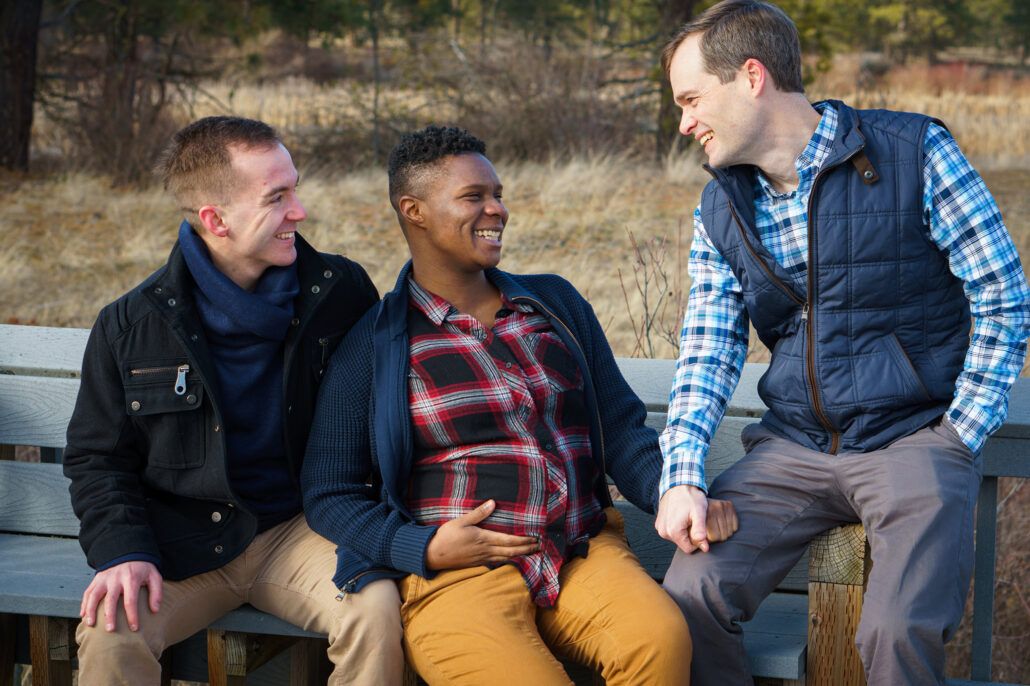Churches face growing challenge as polyamory gains acceptance
News Story by Tracy Simmons | FāVS News
Once considered a fringe relationship style among adults, consensual non-monogamy is gaining visibility across age groups. A recent study revealed that nearly 17% of LGBTQ+ youth surveyed identified as polyamorous or open to such relationships.
This, coupled with research showing over 20% of adults have engaged in consensual non-monogamous arrangements, raises a question for houses of worship: are they ready to address the growing acceptance of diverse relationship structures?
According to many within these communities, the answer is a resounding no.
“It’s so not ready,” said Kerlin Richter, a former Episcopal priest from Portland. “I think the church is still picturing freelove swingers from the 70s.”
After serving her parish for seven years, she faced a year-long church investigation when she came out as polyamorous, ultimately leading to her renunciation of ordination.
In 2015, after being married for 18 years, she and her husband decided to open up their marriage.
“We did not do it thoughtlessly. We did not do it quickly,” she said. “We made a real, loving choice toward each other.”
She said when they married they took the vows of Ruth and Naomi, “Where you go, I will go; where you lodge, I will lodge; your people shall be my people, and your God my God. Where you die, I will die — there will I be buried.”
“We fully believed that then and we still do now,” Richter said. “We’re still happily married and continue to uphold our vows.”
She said the reasons they opened up their marriage are personal. They decided not to lie about their decision if asked, but also not to broadcast their relationship dynamics unprompted.
Though unaware of Richter’s open marriage, parishioners began confiding in her about their own non-traditional relationships.
‘Crazy Sexy Advent’
She had already challenged traditional boundaries within her congregation by launching “Crazy, Sexy Advent,” a Zoom series that opened frank discussions about sexuality and faith.
One congregant confessed that she feared rejection from the church if they discovered her polyamorous relationship.
“I was able to offer pastoral care and counseling, but it looked like a monogamous person trying to be slightly woke,” Richter recalled.
Everything shifted when Richter, at 44, fell in love with her new partner and they decided to have a baby together, with her husband’s blessing. They opted for third parent adoption and decided to raise the baby together.
She recalled the adoption ceremony, where a Mary Oliver poem was read and the baby was given a stuffed animal by the judge.
“It was an incredibly, affirming, beautiful time for us as a family,” she said.
But her private life was now visible.
Richter went to the bishop for guidance, but was told she needed to either renounce her order or return to monogamy.
In 2023, she was fired from her position as rector.
She fought it at first, but after a year of legal battles she said she realized she couldn’t win.
“I thought I’d be able to explain why the shape of my family was not sinful, why it wasn’t a violation of my marriage or my ordination vows, but there was no space for any of that to actually happen,” Richter said.
She argues that poly relationships are valid and a potentially beneficial family structure that should not be condemned by the church, adding that many non-monogamous relationships are modeled in the Bible.
Definition of marriage
The Episcopal church, like many denominations, defines marriage as a life-long union between two people.
Many theologians remain firm in believing marriage has firm boundaries.
Contemporary theologians like J.I. Packer (who died in 2020) defined biblical marriage as an exclusive relationship between one man and one woman for life. He writes, “The increasing acceptance of polyamory by progressives and (soon-to-be former) evangelicals is a symptom of the state of the church’s witness to God’s normative pattern for sexuality…”
Brian G. Murphy, one of the founders of queertheology.com, said for these reasons many polyamorous clergy remain closeted.
“There’s no Christian denomination that I know of that says it’s OK to be polyamorous,” he said. “They’ve got this handbook about what fidelity or commitment looks like and so to include polyamory, they’d have to reimagine all of that, then also rewrite it.”
Polyamory in houses of worship
Even though several religious institutions made strides in affirming gay marriage and the ordination of gay clergy, Murphy said they are miles away from accepting concensual non-monogamous relationships.
“I think if you read the Bible it’s much easier to see polygamy in the Bible than explicitly queer marriage, but on a practical logistical level, gay marriage is easier to accommodate, because you just remove the gender restrictions and you keep the whole framework intact,” he explained. “So, allowing gays and lesbians and bisexuals into the institution of marriage is a relatively conservative project, whereas figuring out how to make room for non monogamy, totally upends it, right?”
Murphy is a former Evangelical who recently converted to Judaism.
For many, like Richter, his website is one of the only resources for poly people of faith. It offers programs like “Polyamory & Christianity Course” designed to support individuals at the intersection of Christianity and polyamory or open relationships and initiatives like “Poly Possibilities” — an initiative that brings together religious non-monogamous people to explore how polyamory and spirituality enrich one another.
“There’s not a whole lot of places to go when wrestling with those questions,” Richter said.
Polyamory in Spokane
Jac Archer lives in Spokane with their 3-year-old daughter and both of their husbands — one legally recognized by the state, the other bonded through a commitment ceremony. Both men are legal parents to their daughter.
“I feel very blessed to live in a state that allows me to craft the home life and family that I want, without prejudice,” Archer said. “And it’s queer and poly and beautiful.”
Archer grew up Seventh-day Adventist, but left the church long ago.
Now, a local activist and law school student, they said they surround themself with a community that supports them.
That includes Archer’s parents and one of two siblings, who remain faithful Adventists.
“They actually came to my wedding last summer, which was pretty cool,” Archer said.
Last summer was when Archer had a commitment ceremony with their second partner.
They said it was a ceremony that symbolized the melding of their families, and included multiple sets of vows.
Families of the polyamorous

Archer said their parents were able to witness the love Archer shares with their partners, though their dad struggles with the concept of polyamory.
“He doesn’t get it because his views around marriage revolve around Christianity, that I don’t fully understand because I don’t remember that ever being heavily discussed,” they said, adding that they never talked about the number of people involved in a marriage.
“That probably wasn’t even a question in people’s minds right? So my dad has these feelings about marriage and monogamy that I don’t fully understand,” they said.
However, Archer said they commend their parents for not throwing out their beliefs for them. They’ve always made it clear that their theological wrestling is theirs, not Archer’s.
“They’ve never put it on me. My mom said something to the effect of she believes she’s called to be my parent and to love and support me and so she’s loving and supporting me, because that’s what God wants her to do,” Archer said.
Archer said when they travel home (near Walla Walla), where their former religious community remains, they are met with “two flavors of acceptance.”
“One is ‘Well, that’s your marriage and your life and I can’t hold you to my standards because you left the church.’ OK, shrug. The other flavor is ‘I will justify this in my head … in the Bible most of the patriarchs had multiple wives, so I will make room for this,’” Archer said.
The second picture, they noted, is less common.
Could Jesus be pan-sexual and polyamorous?
Murphy has written a lot about polyamory in the Bible, even going so far as to say that Jesus is in a “pan-sexual, polyamorous relationship” with the entire body of believers and suggests that God’s love for multiple people can be a model for romantic and sexual relationships, drawing parallels between divine love and polyamorous love.
He argued that Paul uses the word “marriage” to describe Jesus’ relationship with the church and that Jesus is “married” to the entire body of believers, not just one person.
Murphy’s interpretation suggests that Jesus’ love for humanity transcends gender and is shared with multiple individuals simultaneously, and says that faith leaders can do better in serving the poly community.
“Language matters, and representation matters,” he said, adding that clergy also need to be clear in explaining any limitations they have.
While some clergy privately support non-monogamous congregants, they may face losing their jobs if they officiate polyamorous weddings — a reality they must be transparent about, Murphy said.
How houses of worship can move forward in a polyamorous reality
Archer said houses of worship can do things logistically to be more inclusive, too.
For instance, they can plan family events with the understanding that every family looks different.
“Stop assuming you only need two slots on this form for parents,” Archer said, adding that for events, the door should be left open for multiple people to be involved. “Really, all I’m saying is make your forms and programming more inclusive and less dependant on binaries.”
To poly people who don’t feel comfortable going into a house of worship, Murphy reminds them that they are still loved by God.
“God is already dwelling amongst us and in us and in our relationships,” he said. “You are already holy and actually it’s the church that should be knocking on your door because polyamorous people have unique insights into the divine.”
He continues to write about faith and polyamory in his forthcoming book, “Love Beyond Monogamy: How New and Ancient Insights on Polyamory Will Enrich Your Spirituality and Sexuality,” which is expected to be published in 2025.














I’m into philosophical aphorisms and here’s one from Tolstoy: “If it is true that there are as many minds as there are heads, then there are as many kinds of love as there are hearts.”
Despite all the talk of monogamy in today’s Christian churches, I once counted (because I’m that one) 8 different kinds of marriage in the Bible: polygamy, levirate, slave marriage, concubines, wives obtained as spoils of war, assault marriage, and incestuous marriage until the New Testament revisions to monogamy.
My latest personal thinking is that the universe is expanding at an accelerated rate and we’re going along with it, expanding our hearts and heads (hopefully) whether we like it or not. Written doctrine is a curse if held as unerring and unadaptable to our expanding knowledge and modernity.
Doctrines that teach people that God is love and they must seek God shouldn’t be surprised when people find it. When the secular world out-loves (out-Gods) the doctrine, is it worthy of obedience?
One last thing: it is a relatable tragedy when love is denied in literature and film. We’re trained to avoid tragedy, to follow our hearts, and to value authenticity.
Wow! Eight different kinds of marriage. Love that you counted that!
This was very interesting. Thinking about Esther Perel’s Mating in Captivity, Ricter’s idea of marriage as community coincides to Perel’s ideas that a spouse/partner cannot be the village we all need for support and family.
I love Esther Perel!